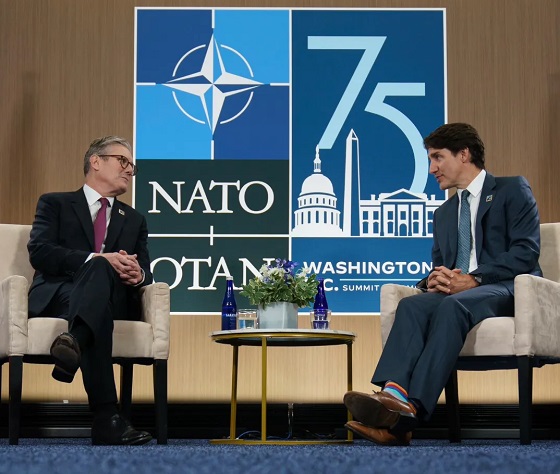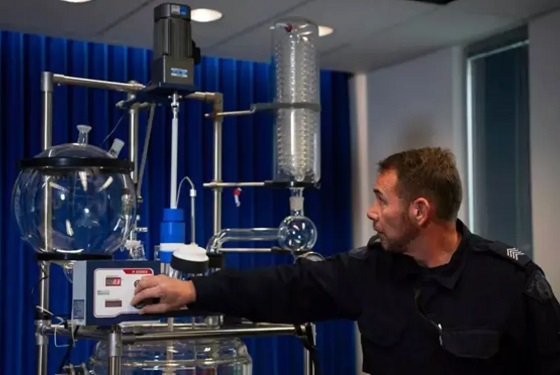espionage
Starmer Faces Questions Over Suppressed China Spy Case, Echoing Trudeau’s Beijing Scandals

Alleged political meddling in a collapsed espionage case targeting Starmer’s China-critical opponents sparks crisis of confidence in Whitehall’s independence.
Keir Starmer’s government is undergoing a credibility crisis over national security, with the Prime Minister himself facing mounting questions about whether he wielded political influence to have Whitehall’s independent prosecution service abruptly drop a rare Official Secrets Act case alleging a China-directed political-intelligence network inside Parliament — one that reportedly targeted Starmer’s opponents critical of Beijing.
Two men — parliamentary researcher Christopher Cash and academic Christopher Berry — had been due to stand trial this autumn, accused of gathering sensitive political research from Westminster between late 2021 and February 2023, including on the China Research Group of Beijing-sceptic MPs, and funnelling it onward to a senior figure in the Chinese Communist Party.
“The government deliberately collapsed the trial of two people who spied on MPs for China. I’m one of the sanctioned MPs & we will get to the truth about who ordered this. I believe this goes all the way to the top,” Conservative MP Neil O’Brien wrote Sunday.
The geopolitical echoes of this case resonate far beyond Westminster. A similar pattern has unfolded in Canada, where Justin Trudeau’s Liberal government — also perceived as favouring trade and engagement with Beijing — was accused of turning a blind eye to intelligence warnings that China’s Ministry of State Security was gathering information on Conservative MPs critical of Beijing, including Michael Chong, who incurred China’s wrath by sponsoring a motion recognizing the CCP’s repression of Uyghurs as genocide.
Multiple outlets have reported that British intelligence believed the information gathered on Conservative MPs critical of China inside Whitehall was destined for Cai Qi, China’s fifth-ranking leader, a Politburo Standing Committee member and confidant of Xi Jinping. The Guardian’s reporting of Cai’s alleged role underscores the extraordinary level of authority to which information targeting British parliamentarians may have been directed. The China Research Group itself included high-profile MPs such as Iain Duncan Smith, Tom Tugendhat, and Neil O’Brien — all sanctioned by Beijing for their outspoken positions on Hong Kong, Xinjiang, and broader human-rights issues.
In Canada, a similar pattern emerged when Conservative MP Michael Chong was likewise sanctioned by China and later revealed as a target of Ministry of State Security intelligence-gathering. Justin Trudeau and his staff were accused of failing to alert Chong to Canadian intelligence reports forwarded to the Prime Minister’s senior officials, which detailed Beijing’s targeting of Chong and his family in Hong Kong.
The emerging evidence of parallels is striking: in both countries, during the same 2021 time period, legislators sanctioned and vilified by Beijing were simultaneously subjected to covert information-collection efforts — suggesting a coordinated strategy by the Chinese Communist Party to identify, monitor, and neutralise its most vocal democratic critics.
At the centre of the growing political storm in Whitehall is an allegation that echoes Justin Trudeau’s reported downplaying of threats against his Conservative opponents. In London, the claim is that Downing Street’s top security adviser, Jonathan Powell, decided the government would not permit China to be described in court as an “enemy” — language prosecutors believed was essential to meet the statute’s threshold. After that decision, the Crown Prosecution Service declared it could no longer proceed for “evidential reasons,” and the case collapsed. If accurate, the intervention would represent an extraordinary instance of political calculation colliding with the operational demands of counter-espionage.
With new reporting from Britain today, Starmer is coming under scrutiny for a potential motivation behind what would amount to improper meddling in an independent prosecution — driven, critics say, by Labour’s desire to sweeten relations with Beijing for economic reasons.
Downing Street’s official response to the dropped prosecution has only fuelled the political fire. The Prime Minister’s spokesperson said it was “extremely disappointing” that the CPS decision meant Cash and Berry would not face trial, insisting the decision was “made rightly independently of government.” That claim of independence, however, now looks increasingly hollow in light of Times and Telegraph reporting that the decisive instruction on the “enemy” wording originated from Starmer’s own national-security team.
The move — and the CPS’s refusal to explain why it could present no evidence — has triggered outrage across party lines. Former Conservative security minister Tom Tugendhat, joined by four other MPs, has written to Director of Public Prosecutions Stephen Parkinson demanding a full account of the decision to drop the case and clarification of any communications between the CPS, No. 10, and the Cabinet Office.
The legal explanation for the collapse of this explosive case is technical: the wording of the 1911 Official Secrets Act, which criminalised acts “useful to an enemy.” Prosecutors reportedly determined that to meet the statutory threshold, China would need to be explicitly designated an enemy — a label the current government refused to authorise.
The National Security Act 2023, which replaced the century-old statute, eliminates that outdated “enemy” clause and creates broader offences for “foreign interference” and “assisting a foreign power.” But the new law came into force only in December 2023 and cannot be applied retrospectively to alleged conduct that occurred between 2021 and 2023, according to several legal experts.
In Canada’s Foreign Interference Inquiry, Trudeau faced questioning on his government’s lack of response to CSIS’s “Targeting Paper” — a high-level intelligence document that described how Beijing collected information to classify which Canadian MPs could help China and which could hurt it, in apparent efforts to guide Beijing’s election interference and political influence campaigns.
Trudeau and his senior aides claim he was never informed of the explosive report. Drafted in 2021 and circulated to a small number of public servants in 2023, the Targeting Paper “named names” and outlined how Chinese diplomats categorised Canadian parliamentarians into three groups: those friendly towards Beijing, those neutral or persuadable, and those deemed antagonistic due to their criticism of China’s human-rights record, particularly on issues like the Uyghurs and Hong Kong.
Echoing the allegations now confronting Starmer’s government, Trudeau’s national security adviser and senior bureaucrats reportedly refused to adopt Canadian intelligence’s view that Beijing’s targeting of MPs represented a serious national-security threat that could undermine Canada’s sovereignty, testimony from Ottawa’s inquiry suggested.
In the hearings, Trudeau’s former senior officials Jody Thomas and Janice Charette defended their decisions not to escalate two high-impact 2022 intelligence reports on Chinese interference — including the Targeting Paper — to the Prime Minister.
Crime
The “Strong Borders Act,” Misses the Mark — Only Deep Legal Reforms Will Confront Canada’s Fentanyl Networks

The fallout is a grim roll call of major investigations that collapsed before trial in British Columbia, Alberta, Ontario, and Quebec: Project E-Pirate, E-Nationalize, Syndicato, Cobra, Brisa, and Endgame all aborted.
Bill C-2, Ottawa’s so-called “Strong Borders Act,” promises to secure Canada’s frontiers with new surveillance powers, sweeping ministerial discretion, and higher penalties. But as veteran Canadian investigators know, the bill misses the point. It is an omnibus solution that expands the state’s reach online, while leaving untouched the very legal choke points that have made Canada a permissive financial platform and fentanyl laboratory for cartels, Triads, and state-linked terror networks.
For more than a decade, Canadian and U.S. enforcement leaders have pointed to the same failures. Police are confronting transnational fentanyl labs, a flood of Chinese chemical precursors, Hezbollah-linked laundering, and Mexican cartels setting up on Canadian soil.
Yet they are forced to fight these threats with laws “never designed for today’s criminal landscape,” as Canadian Chiefs of Police president Thomas Carrique recently warned.
Former RCMP investigator Calvin Chrustie testified before British Columbia’s Cullen Commission that, due to judicial blockages arising from Charter of Rights rulings, by 2015 it had become effectively impossible to obtain wiretaps on Sinaloa Cartel figures in Vancouver.
This year, RCMP Assistant Commissioner David Teboul said a proliferation of “commercial-grade chemistry” fentanyl labs in British Columbia — like the sophisticated factory dismantled last year in Falkland, north of Lake Okanagan, where Mexican cartels have quietly taken over domestic biker gang networks — underlined the urgent need for legislative reform.
Canada wasn’t always so overwhelmed by lethal foreign gangs. What happened? Overly permissive immigration rules and porous borders explain part of the story, but the deeper problem lies in the laws that have steadily eroded enforcement power since the early 1990s.
Instead of enabling prosecutions against transnational traffickers of humans, narcotics, and weapons, unintended consequences from misguided jurisprudence surrounding Canada’s Charter of Rights now ensure these cases almost always collapse, or are simply avoided by the Crown.
Two Supreme Court rulings — Stinchcombe and Jordan — have gutted the capacity to prosecute complex crime. Stinchcombe requires exhaustive disclosure of sensitive intelligence, often impossible in Five Eyes investigations that depend on close cooperation between Canada and the United States.
Jordan imposes strict trial ceilings that tick down while Stinchcombe disclosure battles drag on. Criminal lawyers know these two rulings function as trump cards stacked in favor of their clients.
The fallout is a grim roll call of major investigations that collapsed before trial in British Columbia, Alberta, Ontario, and Quebec: Project E-Pirate, E-Nationalize, Syndicato, Cobra, Brisa, and Endgame all aborted. Project Collecteur — a landmark probe linking Hezbollah and foreign terror-financing networks across Canadian cities to transnational drug money laundering, built on U.S. and Australian intelligence — barely made it to court, despite its far-reaching implications.
It was crippled by RCMP corruption and by underfunded, risk-averse agencies that abandoned Canadian leads painstakingly developed by Five Eyes partners.
How bad was it?
Farzam Mehdizadeh, a major Iranian money launderer and suspected weapons proliferation actor who ran a Toronto currency exchange while shuttling bags of drug cash between Toronto and Montreal, escaped back to Iran just as the RCMP was poised to arrest him on money-laundering charges. The beneficiary of a leaky national police force, evidently.
A senior U.S. enforcement source told The Bureau that during Project Collecteur, the RCMP stumbled onto an even bigger Chinese money launderer while probing Iranian networks, but the agency ignored the file — reportedly unable to shift its original investigation focus onto new enterprise targets.
These kinds of policing failures and decisions are part of the reason President Donald Trump has said senior U.S. investigators told him that Canada lacks the resources and capacity to confront fentanyl trafficking gangs.
In Washington, there is frustration — and at times a lack of understanding — that Stinchcombe either bars or effectively scares the Mounties out of cooperating with U.S. agencies or sharing intelligence.
Derek Maltz, former DEA chief under President Trump, pointed to the Falkland fentanyl super-lab case — part of a U.S.-led probe into Chinese precursor suppliers — as the latest example of “historical issues with the RCMP not sharing properly,” calling it a “major disaster that happened on that big lab in British Columbia.”
“It goes down to the basic information sharing, the antiquated laws,” Maltz said. After meeting with current Canadian police leadership, he concluded: “They’re so far behind and the laws are so antiquated and so archaic.”
The cost is staggering. Officers walk away from enterprise files, knowing they cannot meet disclosure or trial deadlines. Prosecutors refuse to take high-risk cases. U.S. agencies stop sharing intelligence that could be exposed in open court. Canada defaults to “low-hanging fruit” prosecutions while the upper echelons of global networks operate with near impunity.
Meanwhile, at the border, permissive Non-Resident Importer rules allow foreign entities to move chemical precursors through Canadian ports under layers of corporate opacity. Chinese logistics hubs repackage bulk fentanyl shipments bound for Vancouver, obscuring Canada’s visibility into their true origin. Once in Canada, packages can be collected by foreign nationals who further conceal their identities. To visualize the scheme, think of an “end-to-end encryption” app — Chinese trafficking networks enjoy the same kind of seamless concealment when shipping narcotics into Canada.
At the same time, Vancouver’s port — stripped of federal police under Jean Chrétien’s Liberal government — has container inspection rates below one percent, according to a British Columbia study.
It doesn’t seem that Bill C-2 will do anything to address these core vulnerabilities. It gives Ottawa broad powers to expand online surveillance, which may help with the drug networks that now brazenly advertise street sales on social platforms. But it would do so by subjecting all Canadians to invasive cyber surveillance. The bill does not target the transnational criminals who are already easy to identify and well known to law enforcement. These networks continue to operate openly in Canada, confident that the Charter shields them from real prosecution.
Meanwhile, experts warn that parts of C-2 resemble Ottawa’s wish list of new powers tossed into a grab bag. The effect is the opposite of inspiring public confidence or addressing the real enforcement crisis. As written, Bill C-2 could do more harm than good. Mark Carney’s government should shelve it and start again with the reforms Canada actually needs.
The Bureau is a reader-supported publication.
To receive new posts and support my work, consider becoming a free or paid subscriber.
espionage
North Americans are becoming numb to surveillance.

Eliminating Quiet Skies is hopefully just a start. The government spent $200 million a year following up to 50 people a day for a program that in its history never once led to an arrest, or thwarted a single criminal act.
Last year, former Hawaii Congresswoman and Presidential Candidate Tulsi Gabbard was placed in a surveillance program called Quiet Skies by the Transportation and Security Administration. Across eight flights she was subject to intrusive searches, followed by bomb-sniffing dogs, and trailed by three Federal Air Marshals per flight, who if they were following procedure were attempting to listen to her conversations, following her to airport exits to see who if anyone met her, and even recording how often and at what times she went to the bathroom.
To cover the story I contacted the TSA. They no-commented the main question – “TSA does not confirm or deny whether any individual has matched to a risk-based rule,” they said – but they added, as if in mitigation: ”Simply matching to a risk-based rule does not constitute derogatory information about an individual.”
In other words: “We can’t say if Ms. Gabbard was in the program, but if she was, don’t draw conclusions, because we do this even to innocent people.”
Before Quiet Skies was discontinued by this administration, it was a symbol of the steep decline of federal enforcement since 9/11. The government spent $200 million a year following up to 50 people a day for a program that in its history never once led to an arrest, or thwarted a single criminal act. Despite its demonstrated inutility and grave civil liberties concerns it was re-funded year after year because this is what our government does now: it gathers information on its own citizens as an end in itself.
In a week in which the question of whether federal security officials always tell the truth to Congress is back in the news, it’s worth noting that it’s been 13 years since then-National Intelligence Director James Clapper answered, “No, sir,” and “Not wittingly” when Senator Ron Wyden of Oregon asked, “Does the NSA collect any type of data at all on millions, or hundreds of millions of Americans?”
Clapper later explained that he’d responded in the “least most untruthful manner.”
That episode solidified the principle that if you lie about mass surveillance programs in America, even under oath, you not only get to keep your job, you get to be hired as a professional truth-teller after retirement, a National Security Analyst for CNN. If you try to tell the truth about the same issues, your options are prison or leaving the country forever.
In those 13 years since, Americans became numb to surveillance. It was once a core principle that government couldn’t or shouldn’t spy on citizens without predication. Now much of the country accepts as inevitable the idea that every move we make is being recorded and analyzed.
We know emails and phone conversations are being collected passively, via programs of dubious legality, and the mountains of data we leave behind as our lives move online– from geolocations of cell phones to GPS tracking to travel, banking, and medical records – are increasingly fodder for overt and covert acquisition by federal analysts. As Google admitted last week, federal officials partnered with companies not just to monitor speech but to suppress it on a grand scale.
A lot of these changes have their roots in War on Terror programs that exchanged predication for a pre-crime theory out of Minority Report. Quiet Skies was the paradigmatic example of a program that could take endless liberties with the Constitution because it was secret. When you gather information with no intention of going to court, as the TSA did with Quiet Skies, you never have to justify yourself to a judge. This leads to a lot of what one court called “the exact sort of ‘general, exploratory rummaging’ that the Fourth Amendment was designed to prevent.”
This is a betrayal not just of the public but of people we trained at taxpayer expense to do real and important work. Former Marshal Robert MacLean put it best when he said “The air marshal’s job is to protect the cockpit and the pilots. Let somebody else do the intelligence.”
Similarly in the last decade current and former FBI agents – fellow witness Tristan Leavitt’s firm has represented a number of them – have talked about how since 9/11, the FBI spends less time building cases but does more generalized spying, much of it political. One agent I interviewed said “The distinction between people who believe bad thoughts and people who do bad things” has been “completely lost” on our government since 9/11.
Once you start down the road of collecting information on innocent people, it creates the intellectual justification for doing it again and again. From a contracting perspective, this is the proverbial self-licking ice cream cone, a spiral of endless expense. Morally, all this information-gathering reverses the natural political order, giving elected officials undeserved and unearned power over their bosses – the voters. These programs all need to be reevaluated. A lot of them have to go. People who lie about them in this chamber need to be fired.
Let’s hope the elimination of Quiet Skies is just the beginning. Thank you.
-

 Artificial Intelligence2 days ago
Artificial Intelligence2 days agoThe App That Pays You to Give Away Your Voice
-

 National31 mins ago
National31 mins agoCanada’s birth rate plummets to an all-time low
-

 Health2 days ago
Health2 days agoThe Religious Faith in Vaccines has been Challenged, Forcing New Studies and More Rigorous Standards
-

 Agriculture16 hours ago
Agriculture16 hours agoCarney’s nation-building plan forgets food
-

 Fraser Institute17 hours ago
Fraser Institute17 hours agoAboriginal rights now more constitutionally powerful than any Charter right
-

 Alberta18 hours ago
Alberta18 hours agoAlberta puts pressure on the federal government’s euthanasia regime
-

 Business2 hours ago
Business2 hours agoElon Musk announces ‘Grokipedia’ project after Tucker Carlson highlights Wikipedia bias
-

 Crime3 mins ago
Crime3 mins agoPierre Poilievre says Christians may be ‘number one’ target of hate violence in Canada








